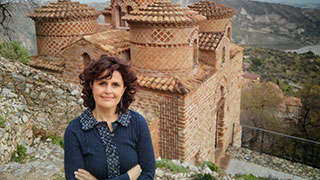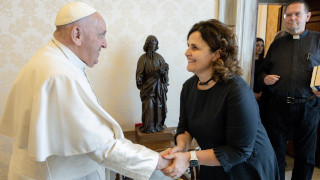Religious Thought Leader Considers Contemporary Evolution of the Papal Office and Ecumenical Openness
Wednesday, May 8, 2024

Ines Angeli Murzaku, Ph.D.
Ines A. Murzaku, Ph.D., professor, Department of Religion, director, Catholic Studies Program, and founding chair, Department of Catholic Studies, highlighted in The Catholic World Report a notable change made recently in the 2024 Pontifical Yearbook, the restoration of the papal title Patriarch of the West in her column, "Pondering the restoration of a papal title."
Murzaku asserts that Pope Francis in reintroducing "the ‘Patriarch of the West’ among the historical titles might suggest a modernization of the papacy, or more accurately, the contemporary evolution of the papal office and an ecumenical openness."
She reflects how on July 7, 2018, Pope Francis stood with the Ecumenical Patriarch Bartholomew of Constantinople and Pope Tawadros II of Alexandria, patriarch of the Coptic Orthodox Church as they released doves outside the Basilica of St. Nicholas in Bari, Italy.
Murzaku considers,
Is Pope Francis reinstating the title of "Patriarch of the West" to return to the ecclesiology of Sister Churches, with an aim to foster unity in Christ, especially given the urgent need for action amidst the ongoing wars in Ukraine and Gaza? In the 2024 Pontifical Yearbook, Pope Francis has re-instituted this ancient title, which I believe is for the same reasons that Pope Benedict XVI removed it in 2006— to strengthen ecumenical dialogue with the Orthodox, particularly in the context of the current conflicts. In the 2013 Apostolic Exhortation, Evangelii Gaudium Pope Francis reaffirmed his: "… duty, as the Bishop of Rome, to be open to suggestions which can help make the exercise of my ministry more faithful to the meaning which Jesus Christ wished to give it and to the present needs of evangelization."
Providing her own insights, Murzaku notes,
It seems that by reintroducing the title, Pope Francis is advancing John Paul II’s mission of exploring new ways to exercise primacy. He does not shy away from what he previously referred to as "a conversion of the papacy" (Evangelii Gaudium 32). By referring to the "conversion of the Papacy," Pope Francis emphasizes a return to the ultimate source of primacy—Jesus Christ—and to evangelization. This reorientation towards the original sources and the current needs of evangelization likely influenced his decision to reinstate the previously canceled title "Patriarch of the West." Francis’s understanding of the title suggests that his role as pope is to be shared with the Eastern Patriarchs, each working within their own synods and traditions. In the case of Rome, this tradition is Roman, while in the Eastern Catholic Churches, it adheres to their respective customs. According to the Code of Canons of the Eastern Churches, the Roman Pontiff holds supreme power in the Catholic Church; he is a Vicar of Christ and the Pastor of the entire Church, among other titles (can. 43).
Murzaku concludes, "as the Church looks forward to the Jubilee year 2025, the 1700th anniversary of the Ecumenical Council of Nicaea, and Christians worldwide celebrating Easter together in 2025—mirroring the early, undivided Church—there are compelling ecumenical reasons for reintroducing the title "Patriarch of the West," adding, "for all the reasons explained above, the reinstatement of the title 'Patriarch of the West' has been a welcome development. It represents a call for humble dialogue with and within the Pentarchy—the ancient patriarchates tracing their origins back to apostolic times."

Professor Ines was received in private audience with Pope Francis. (Foto ©Vatican Media)
Murzaku is a professor of Ecclesiastical History at Seton Hall, director of Catholic Studies Program and founding chair of the Department of Catholic Studies. Many of her scholarly publications focus on ecumenism and Eastern/ Western Church unity, and she recently enjoyed a private audience with Pope Francis, who had written the preface for the translation of her book into Albanian, Catholicism, Culture, Conversion: The History of the Jesuits in Albania (1841-1946), published by the Society of Jesus Publishing House in Tirana, Albania, and presented to the public on the 10th anniversary of Pope Francis' pontificate. Pope Francis himself writes in the preface of the book: "I am happy for the publication of the book, History of the Jesuits in Albania," she said.
In 2023, she accepted the invitation to join the International Women’s Network, a new initiative of the Vatican Dicastery for Interreligious Dialogue, as well as the invitation to join the Inter-Religious Dialogue and Peace-Building Research Group of the Institute of European Studies and Human Rights at the Pontifical University of Salamanca in Spain. She earned a doctorate of research from the Pontifical Oriental Institute in Rome part of the Pontifical Gregorian University Consortium and has held visiting positions at the Universities of Bologna and Calabria in Italy and University of Münster in Germany.
To read the full article, visit The Catholic World Report’s article "Pondering the restoration of a papal title."
Categories: Faith and Service





